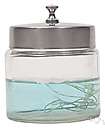a·sep·sis
(ə-sĕp′sĭs, ā-)n.
1. The state of being free of pathogenic microorganisms.
2. The process of removing pathogenic microorganisms or protecting against infection by such organisms.
American Heritage® Dictionary of the English Language, Fifth Edition. Copyright © 2016 by Houghton Mifflin Harcourt Publishing Company. Published by Houghton Mifflin Harcourt Publishing Company. All rights reserved.
asepsis
(əˈsɛpsɪs; eɪ-)n
1. (Medicine) the state of being free from living pathogenic organisms
2. (Medicine) the methods of achieving a germ-free condition
Collins English Dictionary – Complete and Unabridged, 12th Edition 2014 © HarperCollins Publishers 1991, 1994, 1998, 2000, 2003, 2006, 2007, 2009, 2011, 2014
a•sep•sis
(əˈsɛp sɪs, eɪˈsɛp-)n.
1. absence of the microorganisms that produce sepsis or septic disease.
2. methods, as sterile surgical techniques, used to assure asepsis.
[1890–95]
Random House Kernerman Webster's College Dictionary, © 2010 K Dictionaries Ltd. Copyright 2005, 1997, 1991 by Random House, Inc. All rights reserved.
asepsis
1. absence of bacteria of a harmful nature.
2. the techniques of achieving this condition. — aseptic, adj.
See also: Cleanliness2. the techniques of achieving this condition. — aseptic, adj.
-Ologies & -Isms. Copyright 2008 The Gale Group, Inc. All rights reserved.
ThesaurusAntonymsRelated WordsSynonymsLegend:
| Noun | 1. |  asepsis - (of non-living objects) the state of being free of pathogenic organisms asepsis - (of non-living objects) the state of being free of pathogenic organismssanitariness - the state of being conducive to health |
| 2. |  asepsis - the process of inhibiting the growth and multiplication of microorganisms asepsis - the process of inhibiting the growth and multiplication of microorganismsbiological process, organic process - a process occurring in living organisms |
Based on WordNet 3.0, Farlex clipart collection. © 2003-2012 Princeton University, Farlex Inc.